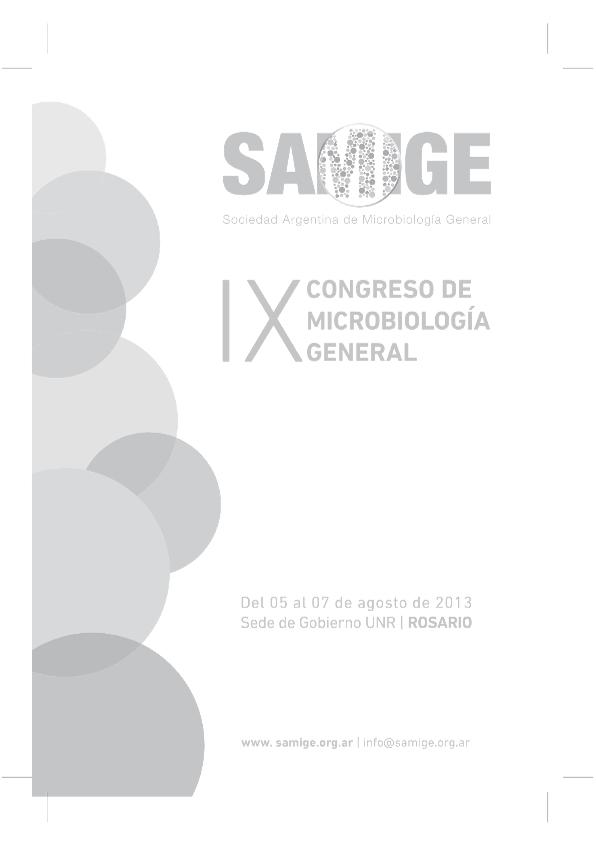Mostrar el registro sencillo del ítem
dc.contributor.author
Manfredi, Adriana Paola

dc.contributor.author
Etchegorry, Victor Daniel

dc.contributor.author
Martinez, Maria Alejandra

dc.contributor.author
Perotti, Nora Ines

dc.date.available
2023-03-20T13:32:47Z
dc.date.issued
2013
dc.identifier.citation
Insect guts as source of efficient cellulases producing bacteria; IX Congreso Nacional de Microbiologia General ; Rosario; Argentina; 2013; 1-2
dc.identifier.uri
http://hdl.handle.net/11336/190982
dc.description.abstract
Plant biomass contains the most abundant biopolymers on the planet, including cellulose, and has been recognized as a potentially sustainable source for biofuel production. Bacterial cellulases are a key tool in order to achieve an efficient utilization of such biomass. In nature, many insects feed on plant biomass. Among other resources, they carry complex microbial consortia symbiotically living in their intestines to digest lignocellulosic material. Here, we report the use of guts of insects belonging to Lepidoptera and Coleoptera as a source of glucanase producing bacteria. Different culture media, both rich and oligotrophic were supplemented with carboxymethylcellulose (CMC), sugar cane bagasse or filter paper. They were inoculated with macerated intestines and cultured under aerobic conditions. After successive subcultures during two months, we obtained several bacterial populations capable of degrading the substrates assayed. Individual colonies were isolated on agar plates with CMC and Congo Red to reveal endoglucanases, and filter paper in liquid media as indicator of exoglucanases. Over 350 isolates, an important proportion (ca. 58%) showed significant hydrolysis halo using Congo Red. However, only 48 isolates (ca. 13%) were selected on the basis of endoglucanase activity determined by the 3,5-Dinitrosalicylic acid (DNS) method, with values between 0.01 to 1.5 U / mL, and / or by their ability to degrade partially or totally paper filter. Bacterial isolates were taxonomically characterized by means of sequence analysis of the 16S rRNA gene. A remarkable prevalence of Firmicutes was observed (> 85%), with 51.2% of isolates related to Bacillus spp. and 12.2% to Paenibacillus spp., 17.1% to Brevibacillus spp., and 2.4% to Staphylococcus spp. Also, a few isolates related to other phyla were also selected (Beta and Gamma proteobacteria and actinobacteria). Nonetheless, it is clear that the methodology used restricts the selection of bacteria to those which enzymatic activity is extracellular, mainly on CMC as substrate and within the limited sensitivity of the DNS method.
dc.format
application/pdf
dc.language.iso
eng
dc.publisher
Sociedad Agentina de Microbiologia General
dc.rights
info:eu-repo/semantics/openAccess
dc.rights.uri
https://creativecommons.org/licenses/by-nc-sa/2.5/ar/
dc.subject
Hydrolases
dc.subject
Cellulases
dc.subject.classification
Bioproductos, Biomateriales, Bioplásticos, Biocombustibles, Bioderivados, etc.

dc.subject.classification
Biotecnología Industrial

dc.subject.classification
INGENIERÍAS Y TECNOLOGÍAS

dc.title
Insect guts as source of efficient cellulases producing bacteria
dc.type
info:eu-repo/semantics/publishedVersion
dc.type
info:eu-repo/semantics/conferenceObject
dc.type
info:ar-repo/semantics/documento de conferencia
dc.date.updated
2023-03-14T11:06:16Z
dc.journal.pagination
1-2
dc.journal.pais
Argentina

dc.journal.ciudad
Rosario
dc.description.fil
Fil: Manfredi, Adriana Paola. Universidad Nacional de Tucumán. Facultad de Ciencias Exactas y Tecnología; Argentina. Consejo Nacional de Investigaciones Científicas y Técnicas. Centro Científico Tecnológico Conicet - Tucumán. Planta Piloto de Procesos Industriales Microbiológicos; Argentina
dc.description.fil
Fil: Etchegorry, Victor Daniel. Consejo Nacional de Investigaciones Científicas y Técnicas. Centro Científico Tecnológico Conicet - Tucumán. Planta Piloto de Procesos Industriales Microbiológicos; Argentina
dc.description.fil
Fil: Martinez, Maria Alejandra. Consejo Nacional de Investigaciones Científicas y Técnicas. Centro Científico Tecnológico Conicet - Tucumán. Planta Piloto de Procesos Industriales Microbiológicos; Argentina
dc.description.fil
Fil: Perotti, Nora Ines. Universidad Nacional de Tucumán. Facultad de Ciencias Exactas y Tecnología; Argentina. Consejo Nacional de Investigaciones Científicas y Técnicas. Centro Científico Tecnológico Conicet - Tucumán. Planta Piloto de Procesos Industriales Microbiológicos; Argentina
dc.relation.alternativeid
info:eu-repo/semantics/altIdentifier/url/https://samige.org.ar/wp-content/uploads/2022/10/Libro-samige-2013.pdf
dc.conicet.rol
Autor

dc.conicet.rol
Autor

dc.conicet.rol
Autor

dc.conicet.rol
Autor

dc.coverage
Nacional
dc.type.subtype
Congreso
dc.description.nombreEvento
IX Congreso Nacional de Microbiologia General
dc.date.evento
2013-08-05
dc.description.ciudadEvento
Rosario
dc.description.paisEvento
Argentina

dc.type.publicacion
Book
dc.description.institucionOrganizadora
Sociedad Agentina de Microbiologia General
dc.source.libro
IX Congreso Nacional de Microbiologia General
dc.date.eventoHasta
2013-08-07
dc.type
Congreso
Archivos asociados
